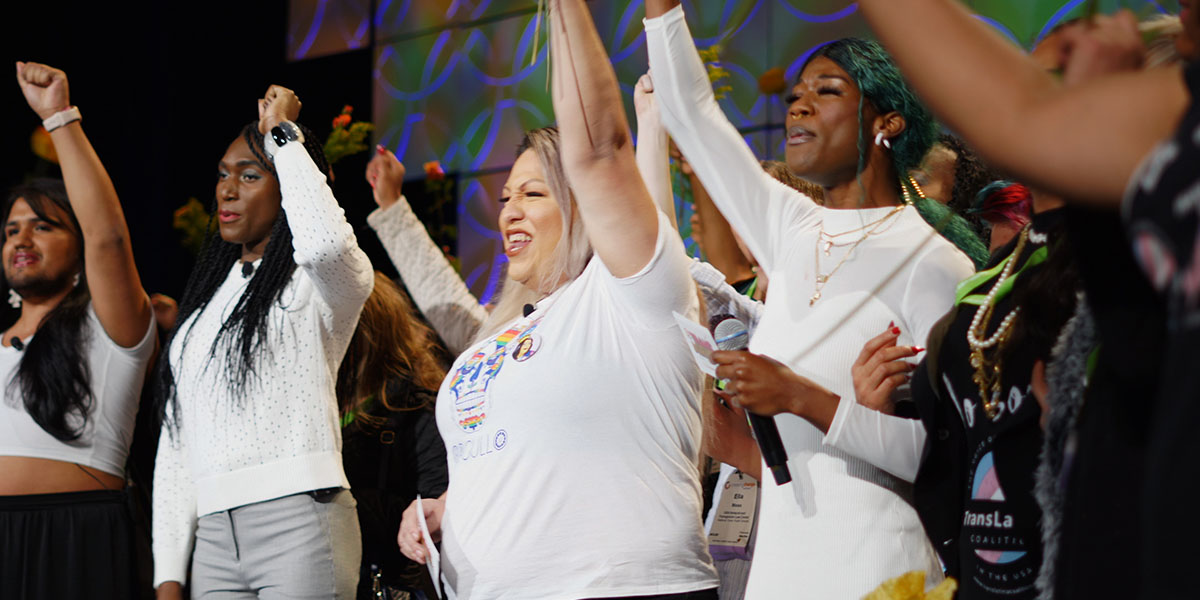Defining The Problem
Sex work is work. Sex workers are legitimate workers. As Black and brown transgender sex workers, we demand the full decriminalization of sex work and the end to the stigma, violence, and policing that plagues our communities. It is impossible to be genuinely committed to ending violence against trans communities, particularly trans women of color, without a commitment to decriminalizing sex work.
There is nothing inherently dangerous about sex work, the same way that there is nothing inherently dangerous about sex. But when sex work, as with any industry, is imbued with shame, racist policies, unchecked police power, and misogyny, it becomes dangerous. Nine in ten trans sex workers report being harassed, attacked, or assaulted by the police, and police force many transgender sex workers to engage in sex to avoid arrest. Further, three out of four transgender sex workers have experienced sexual violence or intimate partner violence at some point in their lives. Many trans women of color who have been murdered were sex workers or have engaged in sex work at some point in their lives.
Policies that criminalize sex work or the platforms we use push us further underground, making it that much more dangerous. More than a third of transgender sex workers use online platforms for advertising, which allows them to screen clients, advertise safely, and have more ownership of their work. Misguided policies that criminalize or regulate these spaces, such as SESTA/FOSTA Policies, which became law in 2018, only place transgender sex workers at greater risk of harm and limit our self-determination by removing platforms that we’ve used to work safely.
Efforts that focus on softening legal consequences for sex work-related charges, such as arrest diversion programs or “johns” school — where people who’ve been arrested for soliciting sexual services are deterred from doing so again — legitimize the belief that there is something inherently wrong with sex work. It supports the idea that sex workers, and those who buy sex, are deviant and require intervention. Further, they divert resources away from our communities and into the racist and transphobic criminal legal system. We cannot limit our efforts to only reducing the harm of the police state. We should also work towards community-led solutions that allow us to keep one another safe rather than relying on police — we must decriminalize sex work, divert resources away from police, and invest in the safety of our communities.
Any effort that legitimizes the system of policing, including solicitation or loitering laws, only places further harm on Black and brown transgender sex workers. Police are the most egregious source of harm in our work and our lives. We see this harm in the ongoing profiling of Black and brown trans communities, particularly transgender women of color, often referred to as “walking while trans.” Trans migrants are at greater risk of detention and deportation for simply being suspected to be doing survival sex work (Meaningful Work – Transgender Experiences In The Sex Trade (PDF)). We are criminalized for our very existence — as we wait for the bus, walk to the store, or stand outside of a bar, police profile us as being “suspected” sex workers and therefore feel justified to arrest, harass, and perpetuate violence against us.
Defining The Strategy
Like in all areas of work, sex workers deserve to be free of harassment and violence while at work. This cannot and will not happen with more state regulation and control. No system can effectively ensure Black and brown transgender sex workers’ well-being when those systems are built on anti-black, xenophobic, and transphobic values and core beliefs, as is evident in U.S. police forces (How the U.S. Got Its Police Force – Time.com ). Legalization of sex work would increase regulation and surveillance from the government — we demand decriminalization, not legalization.
The broader sex worker rights movement must commit to being anti-racist and center the experiences of Black and brown transgender sex workers. It is too easy to fall into the trap of wanting to appear respectable to the public when a movement starts to gain legitimacy. We see this in the way that national sex worker groups are trading real community connections for small political wins or social approval. These groups inadvertently reinforce a hierarchy of social acceptance — white, cisgender, non-disabled, and wealthy sex workers are portrayed as proper, self-sufficient, and sometimes even glamorous, garnering news articles and television shows about their lives. Meanwhile, Black, trans, poor, and disabled sex workers are depicted as perverse, easily coerced, and needing to be saved. We need a cohesive movement that is accountable to Black and brown transgender sex workers and will no longer allow national groups to undermine our work and our commitment to local communities.
Sex workers have been the family that many of us needed, providing us with the homes that we have always deserved. Sex workers have only been targeted for violence simply for who we are or how we choose to make our income. Sex workers are not only worthy of safety — we’re worthy of dignity and autonomy.
Demands
Acknowledgments
We are deeply grateful to the many people who generously contributed to, reviewed, and offered on Freedom to Thrive, including: Agaiotupu Viena, Cathy Kapua, Mickaela Bee, Ash Stephens, Xoai Pham, Kris Hayashi, Shelby Chestnut, and Emily Waters.

